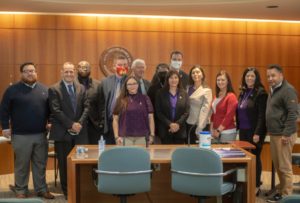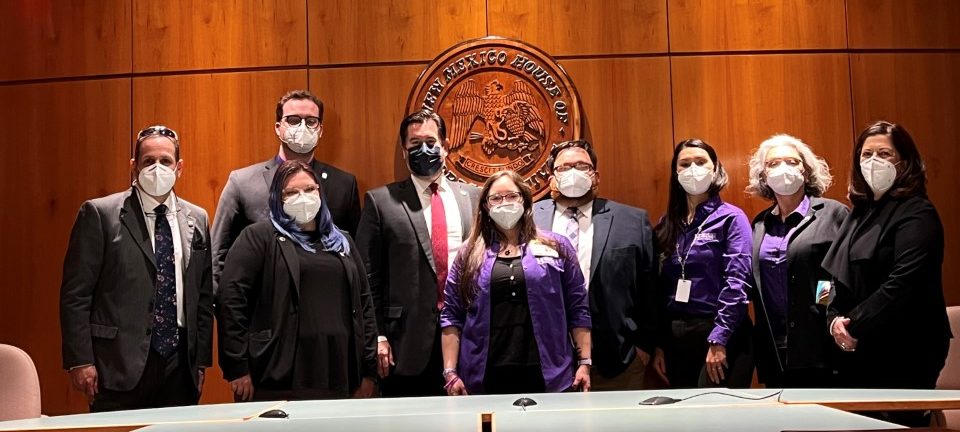
2022 legislative fellows pose at the State Capitol. Pictured from left to right: Manuel Luna, Max Baca, Julius McDade, Michael Plantenberg, Andrea Gomez, David Abbey, Melissa Casias, Jordan Kroeter, Ginger Anderson, Jeannae Leger, Denise Montoya, Mark Valenzuela. Photo Credit: Mya Kai Creative
February 3, 2022
Seven students at New Mexico Highlands University have been selected for the Legislative Leadership Fellowship Program, which allows them to participate in New Mexico’s legislative session and learn about state politics and legislative processes: Ginger Anderson, Staci Bostic-Baros, Andrea N. Gomez, Jordan Kroeter, Manuel Luna, Julius McDade, and Michael Plantenberg.
Denise Montoya, associate vice president for finance, administration, and government relations, and Max Baca, vice president for finance, administration, and government relations develops and enhance this program year to year. Melissa Casias, executive administrative assistant, is key to helping coordinate these efforts.
The fellowship at Highlands is in its fourth year. Interested students go through a selection process early in the fall semester and begin observing legislative hearings in November. Montoya said that this year despite COVID, each fellow was able to shadow legislative officials during the legislative session, and one fellow was hired to work part-time as an intern for the Legislative Finance Committee. In addition, the fellows can receive academic practicum credits through the Department of Political Science. Dr. Elaine Rodriquez, professor and City of Las Vegas council woman, works with students on lobbying legislators and researching and tracking legislation while developing their leadership skills.
“The students learn about the state’s budgeting process and legislation, and we also meet with government officials, including the governor, lieutenant governor, senators, representatives, lobbyists, and leaders throughout the state,” said Montoya. “These leaders share their experiences with the legislative process, discuss issues we face in New Mexico, and provide the students leadership wisdom.”
Montoya said the fellows also spearhead lobbying for a one-time capital outlay request each year. After soliciting ideas from fellow students at Highlands University, the fellows decide on an initiative and learn how to lobby for one-time capital outlay funding. In past years, Montoya said students have received as much as $70,000 to contribute toward initiatives to include improving technology on campus, purchasing gym equipment and gaming devices, and creating a coffee shop ambiance at the Purple Brew where students can study and socialize with their peers.
“This year, the fellows asked for solar panels and recharging stations to reduce the university’s carbon footprint. They conducted research on the savings that it could potentially bring to the university if we were able to install solar panels coverings in the parking lots, and add additional recharging stations,” said Montoya. “They’re asking for a million dollars this year. It’s a bold ask. This group of students is very socially conscientious about protecting our environment.”
“This program provides an opportunity for fellows’ voices to be heard through lobbying efforts that can lead toward creating long-term meaningful change on campus that all students can enjoy beyond graduation,” said Baca. “The fellows’ initiatives help Highlands’s recruit and retain students.”
Fellows successfully partnered with the Attorney General’s office last year, and this year, David Abbey, director of the Legislative Finance Committee (LFC), and Jeannae Leger, assistant director for administration of the LFC and president of Highlands University’s Alumni Association, decided they wanted to be more involved with the Highlands legislative fellows.
Leger attributes her employment with the state legislature to the opportunities Highlands offered her when she was a student.
“Highlands elevates folks to a level that they didn’t think that they could get to. Some people don’t think that they can work for the legislature—I didn’t even know about the legislature myself,” said Leger. “But it was being from Las Vegas and my opportunity of being at Highlands that really got me in the door.”
According to Montoya, student fellows come from small, rural areas like Mora, Las Vegas, and Farmington. International students from Nicaragua and Mexico have also been involved in the program.
Leger said there are five Highlands alumni currently working at the state legislature, and she hopes to see that grow so that there is more representation from the school and more opportunities for people from Northern New Mexico to have an impact on state policy.
“You don’t have to have a degree from a big fancy school. I have seen a lot of people that have big fancy degrees, and Highlands’s folks are just as successful if not more successful, because they really do want to give back,” said Leger. “They’re not about climbing the corporate ladder. They want to do what they can to make a difference.”
Whether or not students want to pursue politics, Leger said the legislative fellowship provides important knowledge and skills that can be applied in a variety of jobs.
“There aren’t a lot of individuals that know or understand the legislative process, so that’s a really good niche to occupy if you understand that,” said Leger. “If you go work for a nonprofit, and you’re looking for money, you’re going to know how to navigate that system. That opens the door, especially as it pertains to state and local government.”
Fellows also can share their stories and perspectives with legislators, which can have an impact on policy making.
“It’s a two-way street. They come to us having work backgrounds and life backgrounds,” said Leger. “We learn from them, they learn from us, and hopefully that influences something down the road for folks.”
David Abbey, director of the Legislative Finance Committee, said it was a privilege to have fellows visit before the session, and to have fellows present to shadow or work during the session.
“We at LFC are very oriented toward bringing analytic minds to the legislature,” said Abbey. “This is a pathway to do that—to help us and to help them advance their careers.”
According to Montoya, the fellowship program has not only resulted in paid internships, but legislative staff are now sending her postings of open positions at the legislature to pass along to interested students.
“I can’t stop speaking highly of this experiential learning opportunity for Highlands’s students, because we track the student participants beyond the program,” said Montoya. “Several of our students were accepted into law school, and one student in particular—Angelica Aragon—said she believed this program helped her get into The University of New Mexico Law School.”
Montoya said former fellows include Katrina Gutierrez, who is currently working for Senator Pete Campos this legislative session, Chris Ulibarri, who serves on the Highlands Board of Regents, and Benito Vigil, a Highlands senior who was recently awarded a national internship with the Hispanic Association for Colleges and Universities.
Montoya credits Highlands’s president Sam Minner with the idea for the legislative fellowship program, and she said vice president for finance, administration, and government relations, Max Baca, has enabled the program to expand due to his efforts lobbying on behalf of Highlands and legislative long-term relationships he has nurtured for decades.
Minner said the fellows are an impressive group of students who represent Highlands University well.
“This program is building the next generation of leaders in New Mexico,” said Minner. “They have a bright future ahead of them.”
Leger said she hopes Highlands’s students will keep shooting for the stars.
“If you have something that you’re passionate about, just go for it,” said Leger. “You’ll end up making more of an impact than you ever thought you could.”
Baca said he and Montoya are already in the planning stages to potentially expand the fellowship program to include federal government opportunities next year.
“We’ve been able to meet with our congressional delegates in Washington, D.C. so we’re hoping to take the students to Washington, D.C., to learn more about federal government initiatives,” said Montoya. “I just got contacted by an organization that offers national internships, and they asked if I had a student recommendation for them to consider. Leaders are starting to learn about this program, and they want to contact some of our students as viable candidates to compete for some of their own programs, both statewide and nationally.”

